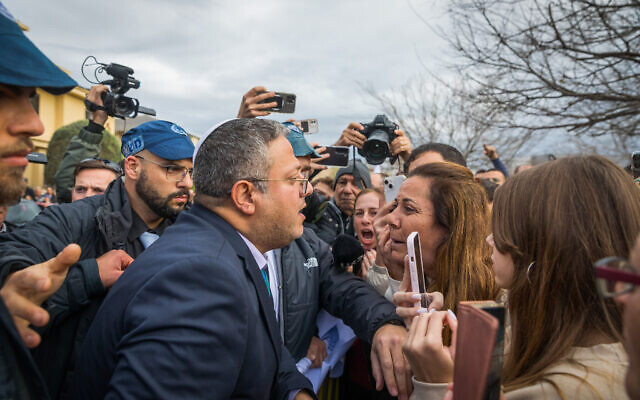Far-right National Security Minister Itamar Ben Gvir warned that if he was not able to exert an influence on the government to adopt his policies, he’d leave it even if it means bringing down the coalition.
Speaking to Channel 12 on Saturday night, the Otzma Yehudit party leader set a deadline of three months during which time, he said, he expected to see at least some of his plans introduced, such as the death sentence for terrorists and the establishment of a civilian guard force.
“As long as I am having an influence, I will not resign,” he said. “I will not bring down the government. ”
For now, he said, “I see that I am having an influence.”
Prime Minister Benjamin Netanyahu’s coalition of far-right and ultra-Orthodox parties holds 64 seats in the 120-seat Knesset. Otzma Yehudit has six of those seats, making it a vital element if the government is to maintain its majority.
Get The Times of Israel's Daily Edition by email and never miss our top stories
Ben Gvir spoke to the station after on Friday he visited the southern town of Gedera, where hours earlier a woman reported that she had been raped in front of her children overnight.

National Security Minister Itamar Ben Gvir, center-left, confronts hecklers in Gedera, hours after a woman reported she was raped in the southern city, February 3, 2023. (Flash90)
Ben Gvir, who vowed to crack down on crime in the south as part of his campaign platform during last year’s election, was heckled by some of the 100 people who staged a protest in front of the Gedera mayor’s house, demanding safety.
Police on Saturday arrested the main suspect, a 22-year-old who was nabbed in the West Bank, while six other people were arrested in connection to the case. Police did not say what the others were suspected of. All of the suspects are residents of unrecognized Bedouin communities in the Negev Desert.
Last month, in the wake of a deadly terror shooting in Jerusalem, Ben Gvir said he would advance legislation allowing Israel to impose the death penalty for certain terror offenses.
A week earlier Ben Gvir said he wanted to establish a volunteer national guard that would be deployed in times of ethnic unrest, such as the May 2021 Jewish-Arab race riots that took place in some Israeli cities against a background of war with the Hamas terror group in the Gaza Strip.
Instituting a death penalty for terrorists had already been high on the coalition’s agenda before an attack in the capital’s Neve Yaakov neighborhood in late January, which has re-energized calls for harsher punitive action against Palestinian perpetrators as well as more severe deterrent measures.
Israel’s legal code includes capital punishment but only for exceedingly rare cases; Nazi mastermind Adolf Eichmann was one of only two people executed by the state in almost 75 years. Right-wing politicians, including some in the current opposition, have long pushed for a law imposing the death penalty on terrorists, but efforts have fizzled due to lack of sufficient support as well as legal issues.


